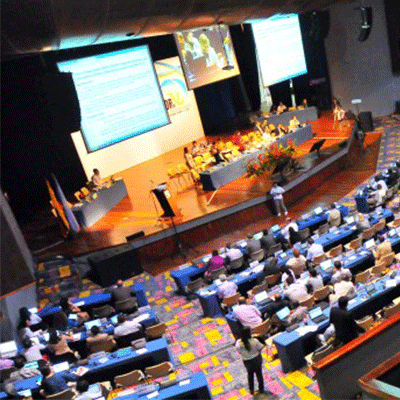 The discovery that developed countries were shipping their toxic waste to Africa and other developing nations for disposal in the late 1980s ignited international outrage and a demand for action. The Basel Convention on the Control of Transboundary Movements of Hazardous Wastes and Their Disposal, commonly referred to as the Basel Convention Treaty, was passed in 1989 with the goal of halting developed nations from dumping its hazardous waste, including e-waste, in less developed countries.
The discovery that developed countries were shipping their toxic waste to Africa and other developing nations for disposal in the late 1980s ignited international outrage and a demand for action. The Basel Convention on the Control of Transboundary Movements of Hazardous Wastes and Their Disposal, commonly referred to as the Basel Convention Treaty, was passed in 1989 with the goal of halting developed nations from dumping its hazardous waste, including e-waste, in less developed countries.
To accomplish that, the Basel Convention strives to address the environmental and human health threats the movement of hazardous wastes poses by promoting environmentally sound management practices. The Basel Convention was the first international treaty to set up a control system for governing the transboundary movement of hazardous waste. There are currently 174 parties, or participants, to the Basel Convention. The United States ratified the Basel Convention and the U.S. Senate gave its advice on consent, however, the U.S. has not yet put in place the implementing legislation required by the State Department to ratify this treaty.
Since the adoption of the Basel Convention in 1992, a number of nontraditional material and waste streams have emerged, such as e-waste. No one envisioned these waste streams when the Basel Convention and other waste management systems were developed over 20 years ago. The remarkable growth in the worldwide use and ownership of consumer electronic devices, fueled in part by the introduction of smartphones and tablets, has contributed to a surge in e-waste. Pike Research estimates that these devices account for about 16 percent of the worldwide total of waste electrical and electronic equipment. Given population demographics and economic indicators, Pike anticipates that 47 billion cubic feet of WEEE will be generated in a 16-year-period from 2010 through 2025.
The worldwide proliferation of electronic devices has contributed to the growth of an informal sector in the e-waste recycling industry that often uses hazardous tear-down procedures and crude material recovery methods that release pollutants into the air, soil, and water. Although the Basel Convention seeks to end this type of dangerous e-waste disposal and the environmental and health risks associated with it by addressing unsound and unlawful management practices, this issue has proven challenging to resolve.
Looking for a way to solve the issues associated with e-waste, the Basel Convention has backed a number of initiatives, including the launch of two public-private partnerships to tackle electronics. The first partnership studied mobile phones and the second, computing equipment. Both initiatives developed technical guidelines that address reuse and recycling as well as procedures for transboundary movement. The computing equipment partnership is also introducing pilot projects in developing countries that focus on collection, the informal sector, and field testing the technical guidelines.
Most recently, a Technical Expert Group (Basel TEG) was formed in December 2011 to develop a framework under Basel for the environmentally sound management of hazardous wastes or other potentially hazardous wastes. This framework is intended to address the ongoing harm caused by inadequate and inconsistent waste management methods.
Made up of 30 experts representing parties to the Basel Convention, the group was tasked with two objectives: establishing a uniform understanding of what ESM encompasses to ensure consistent and comprehensive application of ESM principles and identifying tools and strategies to promote and support carrying out those guidelines.
One of the tools that the Basel TEG is evaluating is third-party certifications, which are regarded as a way to make sure recycling practices are in line with accepted environmentally sound management principles. Patricia Whiting, senior international policy analyst, Sims Recycling Solutions, Americas, addressed this topic as an observer during the Technical Expert Group’s third meeting in January in Glion, Switzerland.
“Sims Recycling Solutions takes our environmental stewardship role very seriously, so being invited to share with the members of the Technical Expert Group our knowledge of what it takes to implement the environmental, health and safety, and data security standards necessary to maintain industry certifications at each of our 53 global sites was recognition of that commitment,” said Whiting.
According to Whiting, the fact that Sims has consistently and successfully implemented certification standards in facilities located everywhere from the United States to Europe to India gives the company a unique perspective on—and firsthand experience with—the rapidly evolving international regulations and recycling infrastructure and capacity shortcomings that the Technical Expert Group is likely to encounter as they move forward with the adoption of this framework.
Noting that Sims was the only electronics recycling company at the meeting, Whiting said, “It’s important for the members of the Technical Expert Group to hear about our real-world experience because, in the end, it will be companies like our own that will be responsible for implementing these standards in the countries where we do business.”
The finished ESM framework will be considered and possibly adopted at the 11th meeting of the Basel Convention’s Conference of the Parties in Geneva in April. Whiting has no doubt that implementing this framework will be an ongoing process. “It will be interesting to see how it finally pans out, but the bottom line is Sims is fully engaged in the development of a global environmental standard that benefits the health and welfare of the citizens of other countries because it’s the right thing to do.”
To view the most recent E-Solution News, click here.
